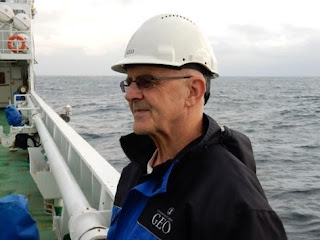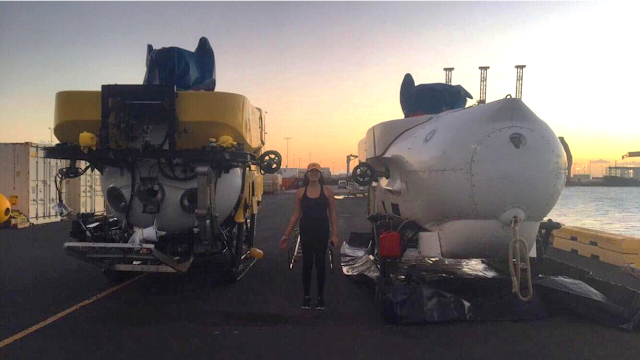Senior Scientist - How to Be an ECR in Your Fifties
by Paul Butler
There was a time, I believe, when you had to be under 35 to stand any chance whatsoever of being an early-career researcher (ECR). On the “expected” academic career path, that allowed you to spend up to 5 years doing your PhD, then enjoy the following nine years as an ECR, with all sorts of career advantages, including reserved access to special grants, cheapo rates at conferences and other benefits that made up for being on the tragic salaries and job security typical of early-stage ECRs. This did not go unnoticed by researchers who had made a jump later in life from some other career into academia, and by researchers who had had their careers interrupted by time taken out to raise families or because of illness. Some people started wondering whether there needed to be an age criterion at all; see the comments here for an idea of the kinds of discussions that were taking place back in 2010 about ECR criteria and how they were failing people with “unconventional” career trajectories [1].
The eventual result has been that nowadays age limits are rarely seen and the definition of an ECR is based on time since finishing a PhD, usually including allowances for career breaks. So, for example, the UK Arts and Humanities Research Council definition of an ECR is "an individual who is within eight years of the award of their PhD or equivalent professional training, or an individual who is within six years of their first academic appointment. These durations exclude any period of career break, e.g. for family care or health reasons."
So where do I fit into all this? I left a relatively lucrative but ultimately unfulfilling career as an IT consultant in London at the age of 47 to do a degree course in Ocean Science at Bangor University in North Wales. A change of path and a change of environment. I had a great interest in how the world works, and it seemed to me that the dynamic processes in the oceans interconnected physics, chemistry, biology and the Earth sciences in a unique and intimate way. Being a bit of an environmentalist, I was also aware of climate change as a potentially existential threat to complex human society and biodiversity, and as the focus of a vitriolic political debate.
One thing about starting late is that your career seems to be over almost as soon as it starts. In some ways that is an advantage since I have been able to have a research-intensive career at an age when many lifelong academics have become disenchanted by the stresses involved in climbing the career ladder. I’ve never needed to do too much teaching. I was never going to have time to become a Professor, so I didn’t need to curry favour with people further up the hierarchy. I’ve never needed to worry about the REF (the Research Excellence Framework, a sadistic assessment of research output used in the UK to implement the “publish or perish” ideology). But I’m on a pension already, and it still seems like there is immense potential in pushing my research field forward. So I’m still looking for funding, but I hope most of that (if I get it) will help kick-start the careers of some of the brilliant young scientists who have entered the field since I started. Exciting times.
There was a time, I believe, when you had to be under 35 to stand any chance whatsoever of being an early-career researcher (ECR). On the “expected” academic career path, that allowed you to spend up to 5 years doing your PhD, then enjoy the following nine years as an ECR, with all sorts of career advantages, including reserved access to special grants, cheapo rates at conferences and other benefits that made up for being on the tragic salaries and job security typical of early-stage ECRs. This did not go unnoticed by researchers who had made a jump later in life from some other career into academia, and by researchers who had had their careers interrupted by time taken out to raise families or because of illness. Some people started wondering whether there needed to be an age criterion at all; see the comments here for an idea of the kinds of discussions that were taking place back in 2010 about ECR criteria and how they were failing people with “unconventional” career trajectories [1].
 |
| Me, Paul Butler, early-career researcher by definition. Photo by Bernd Schöne |
So where do I fit into all this? I left a relatively lucrative but ultimately unfulfilling career as an IT consultant in London at the age of 47 to do a degree course in Ocean Science at Bangor University in North Wales. A change of path and a change of environment. I had a great interest in how the world works, and it seemed to me that the dynamic processes in the oceans interconnected physics, chemistry, biology and the Earth sciences in a unique and intimate way. Being a bit of an environmentalist, I was also aware of climate change as a potentially existential threat to complex human society and biodiversity, and as the focus of a vitriolic political debate.
At the end of that degree course, I was offered the chance to apply for a PhD. This seemed to involve taking a large bag of shells that somebody had collected in the Irish Sea and using them to construct a 1,000-year chronology. You can read about “sclerochronology” elsewhere, but basically it involves studying the marine climate of the past using annual growth increments in sea shells. It was a great help that Bangor University had its own research vessel, the RV Prince Madog, and my PhD was enlivened by stimulating cruises around the UK, at the end of which I had built up a collection of several thousand shells and had published the first shell-based 500-year chronology [2].
 |
| RV Prince Madog takes a breather in Scotland. Photo by Paul Butler |
I had my moment of fame – or notoriety – when I was part of the team that found a clam that turned out to be, at 507 years, the longest-lived non-colonial animal whose age could be determined unambiguously [3]. If that had been a dead shell everything would have been fine but, as luck would have it, the longest-lived animal turned out to have been one that was alive when we collected it. The media had a field day. “World’s oldest creature is revealed to be 507-year-old shellfish called Ming – until scientists KILLED it by opening it up to check its age” said the Mail Online, a statement that is wrong in so many ways I don’t have space to list them [4]. A writer in The Times openly called me and my colleagues “idiots” [5]. Flak came not just from the media and some of its readers, but also from my University, who immediately went into headless chicken mode at the thought that their cash cows, sorry I mean their future students, might be put off applying.
One thing about starting late is that your career seems to be over almost as soon as it starts. In some ways that is an advantage since I have been able to have a research-intensive career at an age when many lifelong academics have become disenchanted by the stresses involved in climbing the career ladder. I’ve never needed to do too much teaching. I was never going to have time to become a Professor, so I didn’t need to curry favour with people further up the hierarchy. I’ve never needed to worry about the REF (the Research Excellence Framework, a sadistic assessment of research output used in the UK to implement the “publish or perish” ideology). But I’m on a pension already, and it still seems like there is immense potential in pushing my research field forward. So I’m still looking for funding, but I hope most of that (if I get it) will help kick-start the careers of some of the brilliant young scientists who have entered the field since I started. Exciting times.
Paul Butler, Ph.D.
Senior Research Fellow, Centre for Geography and Environmental Sciences, College of Life and Environmental Sciences, Penryn Campus, University of Exeter
If you have questions or comments concerning Paul's post, please leave a comment below, or send him an email. You can also connect with him on Twitter.
_____________________________________________________
[1]Andy Humphrey. Age discrimination in funding bodies. Vitae 15th August 2010
[2] Butler, P.G., et al., 2009. Continuous marine radiocarbon reservoir calibration and the 13C Suess effect in the Irish Sea: results from the first multi-centennial shell- based marine master chronology. Earth and Planetary Science Letters 279 (3–4), 230–241.
[3] Butler, P.G., et al., 2013. Variability of marine climate on the North Icelandic Shelf in a 1357-year proxy archive based on growth increments in the bivalve Arctica islandica. Palaeogeography, Palaeoclimatology, Palaeoecology 373 (2013) 141–151.
[4] MailOnline 14th November 2013 Whatever you do, don’t read the comments. OK, you’ll read them, but remember not to come away with the message that ordinary people in general are ignorant – they aren’t - only that a lot of people who take the trouble to comment have a very blinkered approach and like to use news items about science to reinforce their existing prejudices.
[5] Tanya Gold. Speakeasy: Eve couldn’t resist the apple. We’ve snatched Ming the clam. The Times 17th November 2013 Paywalled, thank goodness.
Senior Research Fellow, Centre for Geography and Environmental Sciences, College of Life and Environmental Sciences, Penryn Campus, University of Exeter
If you have questions or comments concerning Paul's post, please leave a comment below, or send him an email. You can also connect with him on Twitter.
_____________________________________________________
References:
[2] Butler, P.G., et al., 2009. Continuous marine radiocarbon reservoir calibration and the 13C Suess effect in the Irish Sea: results from the first multi-centennial shell- based marine master chronology. Earth and Planetary Science Letters 279 (3–4), 230–241.
[3] Butler, P.G., et al., 2013. Variability of marine climate on the North Icelandic Shelf in a 1357-year proxy archive based on growth increments in the bivalve Arctica islandica. Palaeogeography, Palaeoclimatology, Palaeoecology 373 (2013) 141–151.
[4] MailOnline 14th November 2013 Whatever you do, don’t read the comments. OK, you’ll read them, but remember not to come away with the message that ordinary people in general are ignorant – they aren’t - only that a lot of people who take the trouble to comment have a very blinkered approach and like to use news items about science to reinforce their existing prejudices.
[5] Tanya Gold. Speakeasy: Eve couldn’t resist the apple. We’ve snatched Ming the clam. The Times 17th November 2013 Paywalled, thank goodness.






Comments
Post a Comment